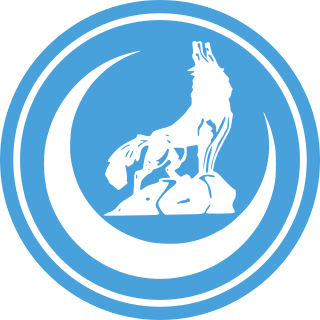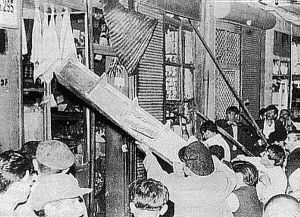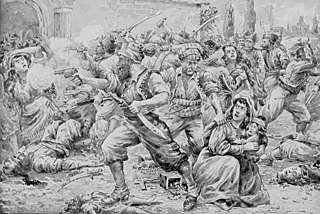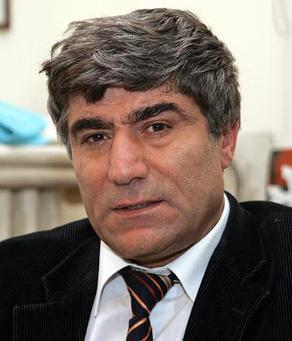
Van is a city in eastern Turkey's Van Province, on the eastern shore of Lake Van. It is the capital and largest city of Van Province.

The Grey Wolves, officially known by the short name Idealist Hearths, is a Turkish far-right paramilitary organization and political movement affiliated with the Nationalist Movement Party (MHP). Commonly described as ultra-nationalist, neo-fascist, Islamonationalist, and racist, it is a youth organization that has been characterized as the MHP's paramilitary or militant wing. Its members deny its political nature and claim it to be a cultural and educational foundation, as per its full official name: Idealist Clubs Educational and Cultural Foundation.

The Istanbul pogrom, also known as the Istanbul riots were a series of state-sponsored anti-Greek mob attacks directed primarily at Istanbul's Greek minority on 6–7 September 1955. The pogrom was orchestrated by the governing Democrat Party in Turkey with the cooperation of various security organizations. The events were triggered by the bombing of the Turkish consulate in Thessaloniki, Macedonia, Greece, – the house where Mustafa Kemal Atatürk was born in 1881. The bomb was actually planted by a Turkish usher at the consulate, who was later arrested and confessed. The Turkish press was silent about the arrest, and instead, it insinuated that Greeks had set off the bomb.
Armenian Americans are citizens or residents of the United States who have total or partial Armenian ancestry. They form the second largest community of the Armenian diaspora after Armenians in Russia. The first major wave of Armenian immigration to the United States took place in the late 19th and early 20th centuries. Thousands of Armenians settled in the United States following the Hamidian massacres of the mid-1890s, the Adana massacre of 1909, and the Armenian genocide of 1915–1918 in the Ottoman Empire. Since the 1950s many Armenians from the Middle East migrated to the United States as a result of political instability in the region. It accelerated in the late 1980s and has continued after the dissolution of the Soviet Union in 1991 due to socio-economic and political reasons. The Los Angeles area has the largest Armenian population in the United States.

Armenian Genocide Remembrance Day or Armenian Genocide Memorial Day is a public holiday in Armenia and the Republic of Artsakh and is observed by the Armenian diaspora on 24 April. It is held annually to commemorate the victims of the Armenian genocide of 1915. It was a series of massacres and starvation of 1.5 million Armenians by the Ottomans. In Yerevan, the capital of Armenia, hundreds of thousands of people walk to the Tsitsernakaberd Genocide Memorial to lay flowers at the eternal flame.
Armenians in Turkey, one of the indigenous peoples of Turkey, have an estimated population of 50,000 to 70,000, down from a population of over 2 million Armenians between the years 1914 and 1921. Today, the overwhelming majority of Turkish Armenians are concentrated in Istanbul. They support their own newspapers, churches and schools, and the majority belong to the Armenian Apostolic faith and a minority of Armenians in Turkey belong to the Armenian Catholic Church or to the Armenian Evangelical Church.

The Special Organization was a paramilitary secret police organization in the Ottoman Empire known for its key role in the commission of the Armenian genocide. Originally organized under the Ministry of War, the organization was shifted to answer directly to the ruling party Committee of Union and Progress (CUP) in February 1915. Led by Bahaeddin Şakir and Nazım Bey and formed in early 1914 of tribesmen as well as more than 10,000 convicted criminals—offered a chance to redeem themselves if they served the state—as a force independent of the regular army

Anti-Armenian sentiment, also known as anti-Armenianism and Armenophobia, is a diverse spectrum of negative feelings, dislikes, fears, aversion, racism, derision and/or prejudice towards Armenians, Armenia, and Armenian culture.

Hrant Dink was a Turkish-Armenian intellectual, editor-in-chief of Agos, journalist, and columnist. As editor-in-chief of the bilingual Turkish-Armenian newspaper Agos, Dink was a prominent member of the Armenian minority in Turkey best known for advocating Turkish–Armenian reconciliation and human and minority rights in Turkey. He was often critical of both Turkey's denial of the Armenian genocide and of the Armenian diaspora's campaign for its international recognition. Dink was prosecuted three times for denigrating Turkishness, while receiving numerous death threats from Turkish nationalists.

Armenia, officially the Republic of Armenia, is a landlocked country in the Armenian Highlands of West Asia. It is a part of the Caucasus region and is bordered by Turkey to the west, Georgia to the north and Azerbaijan to the east, and Iran and the Azerbaijani exclave of Nakhchivan to the south. Yerevan is the capital, largest city and financial center.

Raffi K. Richardi Hovannisian is an Armenian politician, the first Foreign Minister of Armenia and the founding leader of the national liberal Heritage party. He is the founder of the Armenian Center for National and International Studies, the country's first independent research center.

Archbishop Sebouh Chouldjian born Haik Sarkis Chouldjian; Armenian: Սեպուհ արքեպիսկոպոս Չուլճեան; Turkish: Başpiskopos Sebuh Çulcuyan; Russian: Архиепископ Сепух Чулджян; also Sebuh, Sepouh, Sepuh, Chuljian, Tchuljian, Chuljyan, Çulciyan)) was the metropolite of the Diocese of Gougark of the Holy Armenian Apostolic Church.

The Vilayet of Sivas was a first-level administrative division (vilayet) of the Ottoman Empire, and was one of the Six Armenian vilayets. The vilayet was bordered by Erzurum Vilayet to the east, Mamuretülaziz Vilayet to the south-east, the Trebizond Vilayet to the north and Ankara Vilayet to the west.

Rober Haddeciyan, also known as Rober Haddeler, is an Armenian writer, playwright, and since 1967 editor-in-chief of Marmara, an Armenian-language daily newspaper.

Armenians in Istanbul are a major part of the Turkish Armenian community and historically one of the largest ethnic minorities of Istanbul, Turkey. The city is often referred to as Bolis (Պոլիս) by Armenians, which is derived from the ending of the historical name of the city Constantinople.

Mıgırdiç Civanyan was an Ottoman Armenian painter.

The confiscation of Armenian properties by the Ottoman and Turkish governments involved seizure of the assets, properties and land of the country's Armenian community. Starting with the Hamidian massacres and peaking during the Armenian genocide, the confiscation of the Armenian property lasted continuously until 1974. Much of the confiscations during the Armenian genocide were made after the Armenians were deported into the Syrian Desert with the government declaring their goods and assets left behind as "abandoned". Virtually all properties owned by Armenians living in their ancestral homeland in Western Armenia were confiscated and later distributed among the local Muslim population.

In Turkey, racism and ethnic discrimination are present in its society and throughout its history, including institutional racism against non-Muslim and non-Sunni minorities. This appears mainly in the form of negative attitudes and actions by some people towards people who are not considered ethnically Turkic, notably Kurds, Armenians, Arabs, Assyrians, Greeks, Jews, and peripatetic groups like Romani people,Domari, Abdals and Lom.

Arzu Geybullayeva, also known as Arzu Geybulla, is an Azerbaijani columnist, blogger, and journalist for several newspapers and media news outlets including Al Jazeera, Foreign Policy, Global Voices, and Agos. She has also worked with several non-profit organizations and think-tanks including the National Democratic Institute and European Stability Initiative. Geybullayeva was included in the BBC's list of top women in 2014. She advocates a peaceful resolution among Armenians and Azerbaijanis over the Nagorno-Karabakh conflict. However, in recent years, she has received various threats mainly stemming from Azerbaijan due to her work with Agos, an Armenian newspaper. The threats were internationally condemned by various human rights organizations. Geybullayeva lives in a self-imposed exile in Washington D.C.

Relations between Azerbaijan and the Organization for Security and Cooperation in Europe (OSCE) began when Azerbaijan joined OSCE’s predecessor, the Conference on Security and Cooperation in Europe (CSCE), on January 30, 1992. This was the first European organization Azerbaijan joined. The CSCE transformed into the OSCE shortly afterwards in 1995.


















